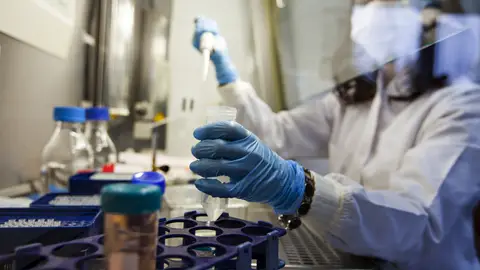For the Second Time in History, Someone Has Been Cured of HIV

For the second time in the decades-long fight against the HIV/AIDS, a patient with HIV has reportedly been cured of the virus.
According to The New York Times, the patient entered "remission" from HIV after he received a bone marrow transplant to treat his unrelated lymphoma diagnosis. The new patient, treated by doctors in Europe and nicknamed "the London patient" for anonymity, mirrors a similar case from over a decade ago, which scientists have spent years trying to replicate.
Researchers dubbed the original patient cured of HIV "the Berlin patient," though he was later revealed to be Timothy Ray Brown, a 52-year-old man who now lives in California. Both Brown and the London patient received cancer-related bone marrow transplants from donors with a mutation in the CCR5 protein.
The kicker? Mutated CCR5 proteins are HIV-resistant and able to prevent the virus from entering cells in the immune system.
Publicly, researchers have dubbed the treatment plan a "cure," though there's a major caveat: Bone marrow transplants are risky procedures with side effects that can last a lifetime. However, scientists are hopeful that the case will further the global fight against the HIV/AIDS epidemic.
In a statement to The Times, the London patient said it was "surreal" to think that he could be cured of both cancer and HIV. "I feel a sense of responsibility to help the doctors understand how it happened so they can develop the science," he added.
Doctors say the London patient, who received his bone marrow transplant in May 2016, stopped his HIV antiviral routine in September 2017 and has remained HIV-free ever since. He and Brown are the only cases of long-term HIV remission ever recorded.
“This will inspire people that a cure is not a dream,” Dr. Annemarie Wensing, a virologist at the University Medical Center Utrecht in the Netherlands, told The Times. “It’s reachable.”
While HIV treatment and prevention options have vastly evolved since the early days of the HIV/AIDS epidemic, new infections are still on the rise among certain vulnerable communities, like gay and bisexual Latinos and LGBTQ Floridians. And PrEP—a preventative drug recommended to people at a high risk of contracting HIV—isn't exactly accessible or affordable to everyone.
Meanwhile, the Trump administration continues to chip away at government funding for potentially life-saving HIV/AIDS research in the United States. Last December, the President quietly banned National Institutes of Health (NIH) doctors from acquiring fetal tissue for medical research, essentially halting NIH research that was believed to be closing in on a cure.





